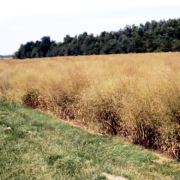Model Illustrates Supply Chain for Second-Generation Biofuels
Researchers at Princeton University and the Great Lakes Bioenergy Research Center modeled a supply chain for second-generation biofuels that addresses both the crop and processing aspects of biofuel production. The model focuses on biofuel derived from agricultural waste or non-food crops grown on low productivity or recently abandoned land in an eight-state region of the Midwest. Other biofuel studies often focus on either the production side or the processing side of the supply chain, at the expense of providing a complete picture. This study used highly detailed data to unite the two spheres and help reveal important considerations in supply-chain sustainability. “Even seemingly isolated or unrelated decisions, like how much incentive you plan to provide for carbon capture or which conversion technology you favor, can have dramatic impacts on the landscape design of a bioeconomy,” noted study co-author Caleb Geissler.

 USDA NRCS
USDA NRCS CanvaPro
CanvaPro USDA photo by Lance Cheung.
USDA photo by Lance Cheung.